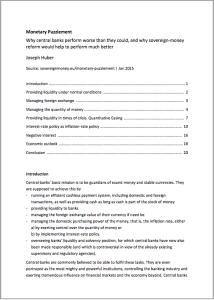Why central banks perform worse than they could, and why sovereign-money reform would help to perform much better

Central banks do in fact have some power, but much less than is commonly thought, writes Prof Joseph Huber in his new paper entitled Monetary Puzzlement.

Here’s a short extract:
Central banks’ basic mission is to be guardians of sound money and stable currencies. They are supposed to achieve this by:
running an efficient cashless payment system, including domestic and foreign
transactions, as well as providing cash as long as cash is part of the stock of money
providing liquidity to banks
managing the foreign exchange value of their currency if need be
managing the domestic purchasing power of the money, that is, the inflation rate, either
a) by exerting control over the quantity of money or
b) by implementing interest-rate policy
overseeing banks’ liquidity and solvency position, for which central banks have now also been made responsible (and which is controversial in view of the already existing supervisory and regulatory agencies).
Central banks are commonly believed to be able to fulfill these tasks. As will be seen, central banks do in fact have some power, but much less than is commonly thought. The predominant monetary power is the banks rather than the central bank. So too it is the banking industry rather than the central banks that is to be blamed for the recurrent crises, even though the activities of a country’s banks and the national central bank are intertwined.
Read more here or download as a PDF.